PROVINCETOWN — Chief Jim Golden and Sgt. Jennifer Nolette on Monday morning defended a controversial police encounter with local young men of color, just over a week after a false report of a “kid … dancing … with a gun in his hand” summoned three police cruisers, sirens blaring, to the East End basketball court.
Starting at 7:17 p.m. on June 18, the three responding officers, Adam Hanna, Daniel Sheehan, and Sgt. Nolette, pulled up to the court in succession. Hanna arrived first and found a white Subaru parked at the court that matched the caller’s description with four 18-year-olds inside. Beside the car, a 16-year-old matching the caller’s description of the person with the gun was leaning on the Subaru’s rear door. All five were Black or Hispanic males. After 10 minutes that involved urgent police commands, frisking, and handcuffing a 16-year-old, the officers had found no firearm.
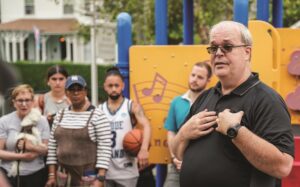
As news of the incident spread through town, questions were raised about the police response. That led to the June 26 meeting at the Mildred Greensfelder Playground, the site of the incident, for what Town Manager Alex Morse called “a conversation about what happened” and an opportunity “to listen to people’s experiences and suggestions for how we move forward as a community.” About 35 people were there.
At that gathering, Nolette said, “I’m so glad it happened this way: that it was false, nobody got hurt. And it was minimal. I’m not saying ‘minimal’ to minimize what it’s done. But it could’ve been so much worse. And now we’re here standing in a really good community, with I think great community policing that we’re trying to do.”
A video of the incident taken from a car parked nearby shows, before Nolette’s arrival, an officer ordering the youths to “put your hands up — don’t you move!” from behind his cruiser door.
“We were so confused,” said Anthony Teixeira, 18, one of the people in the Subaru. “We didn’t know what happened, but we all put our hands up.” He said they had been playing basketball for a couple of hours and were catching their breath and listening to music.
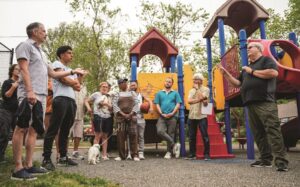
Hanna ordered the young men not to reach for anything. “He had his hand on his belt, where his gun was,” Teixeira said.
Chief Golden said at the playground gathering that no officer drew his gun, which Teixeira confirmed. But as Hanna issued commands, Teixeira said, “He just kept saying, ‘I’ll fucking shoot!’ ”
The video of the incident obtained by the Independent is incomplete; it does not include an officer making that threat.
‘We Were Just Playing’
Hanna’s written report of the incident, made public on June 26, says, “All parties were compliant and began to state ‘We were just playing basketball, what’s going on?’ ”
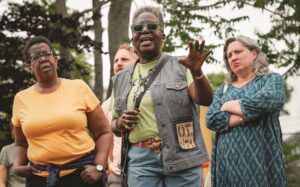
Officer Sheehan arrived one minute after Hanna. He handcuffed the youngest member of the group, who matched the caller’s description: “a Black male with cornrows in a white shirt,” according to Hanna’s report. The boy, 16, was searched by pat-frisk; those in the car had their belongings searched, too.
“I felt like I was going to die for a second,” Teixeira told the Independent in the wake of the incident. “You can’t really heal something like that. It’s going to stay with you forever.”
Ngina Lythcott, a Black Provincetown resident of over 15 years who is a member of the town’s school committee, said she, like the officers, is glad no one was injured. But “what happened to that boy is traumatic,” she said of the youth put in handcuffs. “Microaggressions or macroaggressions that happen to children get embedded deep.”
Lythcott said the incident and “outrageous” police response showed a real need for community policing, which would entail a warmer relationship between residents and officers. “We want them to know our children by their faces,” she said.
Except for Teixeira and the 16-year-old who was handcuffed, both of whom spend summers in Provincetown with their families, the players involved are all year-round residents. The incident report lists Teixeira, Mekhi Kelly, Owens Wells-Benson, and Brandon Fernandes as the occupants of the Subaru. Teixeira and Jay Luster, who frequently plays basketball with the group, said they do not know anyone named Brandon Fernandes. They said the police report omitted Nico Harrington, who was in the car. Harrington, Kelly, and Wells-Benson could not be reached for comment.
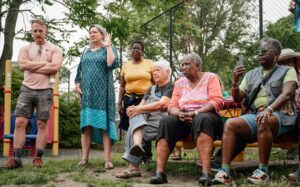
The two incident reports, written by Hanna and Nolette, were not completed until Friday, June 23, five days after the incident. When asked about the delay, Chief Golden said, “Because the incident happened last week, and the officer was on vacation.”
Teixeira said he has been playing basketball at the East End court since he was seven, and that he plays there almost every day. “It’s not like we’re strangers here,” he said, addressing the gathering on June 26. “This is our safe place. Why is that being taken away by you guys?”
He told the Independent that, in the days after the incident, he and his friends had been playing at a different court, one that is “out of town, away from people. We’re all staying out of their way because they did that, and we don’t know what they’re going to do now.”
Teixeira also said that before the June 18 incident police cruisers frequently sat outside the basketball court. “I want to ask you specifically: why are we watched every day?” he said to Golden at the June 26 meeting.
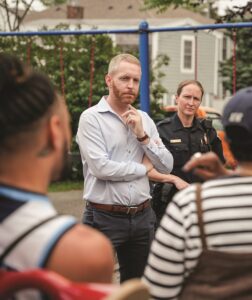
Golden said he did not know. “It could be a nonsinister explanation for why the cop is sitting there,” he said. “He could be typing on his computer. He could be watching the intersection. He could be running radar. There’s a million excuses of why he should be there. But most importantly,” Golden added, “your concerns should not be minimized.”
Morse’s Apology
In a statement posted on the town website on June 26, Morse wrote: “Reiterating what the police sergeant told the group on June 18 once she arrived on scene, and on behalf of the Town, I want to personally apologize for how this incident unfolded and thank the families and the young men involved for their assistance in moving us forward and ensuring Provincetown is safe and welcoming for all.”
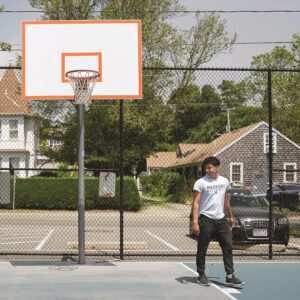
At the meeting earlier that day, select board Vice Chair John Golden said, “An apology is not even near what needs to happen here.” He called for diversity and de-escalation training and suggested that Chief Golden needed to change his ways.
“Jim, I’m very sorry,” said the select board’s Golden, “but you need to be in the front row, because these people are all talking to you, and you’re not listening.”
As he defended the police response, Chief Golden said, “Could it have been better? Yeah. Could it have been worse? Yes. Could it have been way worse? Sure — they could have found a weapon.”
Teixeira said that Nolette was the first to apologize on the day of the incident, and other apologies had followed. But that’s not what Teixeira feels is called for. “You can’t just treat people like that and expect us to be OK with it,” he said.
Cass Benson, whose son Owen Wells-Benson was one of the basketball players in the car, did not see the police as the root of the problem. “The police did whatever police do,” she said, “but the fact that someone in our town had the racism to call in a report like this is just outrageous.”
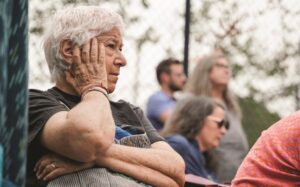
The call was placed by Noe Reyes Jr., 28, who told the dispatcher that he “just happened to be driving by. I would hate for somebody to get hurt.” A recording of the call is posted on the town website. At the end of the call, Reyes added that “it might be nothing,” and the dispatcher said, “No, hey, you did the right thing.”
Officer Hanna called Reyes back after finding no weapons. In that second dall, Reyes said, “I know what handguns look like and it was a handgun in the individual’s hand. If you guys didn’t find it, it’s not on me, but there was one.” At the end of the call, Reyes apologized, and Hanna said, “No worries, don’t be sorry. Thank you so much for your concern.”
“Although we can’t know what the caller’s motivation was in this situation, the weaponization of police by certain people to target and harass people of color is a dangerous and deeply troubling trend in this country,” Morse wrote in his statement. He also said at the community meeting that the police dept. would be rolling out body cameras in the next couple of months, so that responding officers will “know they’re being videoed and that information will always be public.”
At the June 26 select board meeting, member Austin Miller cited Mass. General Law Chapter 269 Section 13, which prohibits “intentionally and knowingly” falsely reporting a crime. “The weaponization of police against people of color in this community is not something any of us should accept or tolerate,” Miller said.
“I’m not saying this to put down the police because I feel like police have one of the hardest jobs,” Teixeira said on Monday “But if you have cruisers sitting there every day, facing towards the court, you have to realize how that looks to us.”



